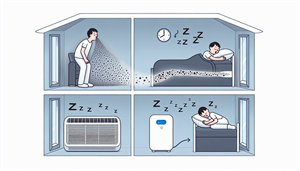
Can Chewing Gum Help Snoring?
Are you or a loved one snoring the night away, disturbing peaceful slumbers and causing daytime fatigue? While snoring is often seen as a mere nuisance, it can strain relationships and lead to serious health complications.
What if we told you that the solution might be as simple and enjoyable as chewing gum? Can chewing gum help snoring, you might ask? Let’s explore this possibility further.
The Science Behind Chewing Gum and Snoring
Snoring, often a symptom of sleep apnea, is caused by the vibration of floppy tissue in the back of the throat due to airflow during breathing. This issue becomes more pronounced when those muscles relax, nearly or completely closing off the airway. Think of it like a garden hose; when it’s kinked, water struggles to get through.
The same happens with your airway if your throat muscles relax too much. Chewing gum, despite its simplicity, emerges as a potential solution.
Chewing gum mirrors the effects of myofunctional therapy by engaging and strengthening both jaw and tongue muscles, thus reducing the floppy tissue in the airway that leads to snoring. In essence, this simple act of mastication can help keep your airway more open and stable during sleep, reducing the chances of airway collapse and snoring.
Jaw Strengthening
The jaw is instrumental in maintaining an open airway during sleep. Chewing gum serves as an effective exercise to curb snoring, as it strengthens the jaw and throat muscles, thereby broadening the airway and minimizing the probability of snoring. This is similar to doing chin-ups or neck curl-ups, which also target the jaw muscles. Consider this as a fitness regime for your jaw. As with any other muscle, your jaw muscles can be trained and strengthened.
Regularly doing this exercise can contribute to overall airway stability and may even aid in addressing sleep disorders like central sleep apnea. Just remember, moderation is key. Overdoing it might lead to tightened facial muscles and persistent headaches.
Tongue and Throat Muscle Workout
Apart from the jaw, tongue and throat muscles are also integral to mitigating snoring and sleep apnea symptoms. Activities such as moving the tongue backward that engage these muscles help stabilize the airway during sleep, thereby resulting in a decrease in snoring.
These exercises, including gargling and the tongue clench exercise, enhance the tone and strength of the tongue and soft palate, promoting a stable airway during sleep and reducing snoring.
Evidence supports these claims. Research has indicated that mouth or tongue exercises have been effective in reducing the frequency of snoring by 36% in patients with mild sleep apnea, demonstrating their potential to reduce sleep apnea symptoms.
Hence, when you’re singing your favorite song or making amusing faces at the mirror, recall that you’re also exercising your entire tongue and throat muscles by moving your tongue upward!
Additional Mouth and Throat Exercises for Snoring Relief
While chewing gum can be a great starting point, there are additional exercises that can amplify these benefits. Other mouth and throat exercises, like gargling, pronouncing vowel sounds, and even singing, can all aid in reducing snoring by further strengthening the muscles involved in breathing and airway stabilization.
However, bear in mind that although these exercises can offer relief, they may not be a standalone solution for severe cases of sleep apnea. Professional consultation is vital for proper diagnosis and treatment.


